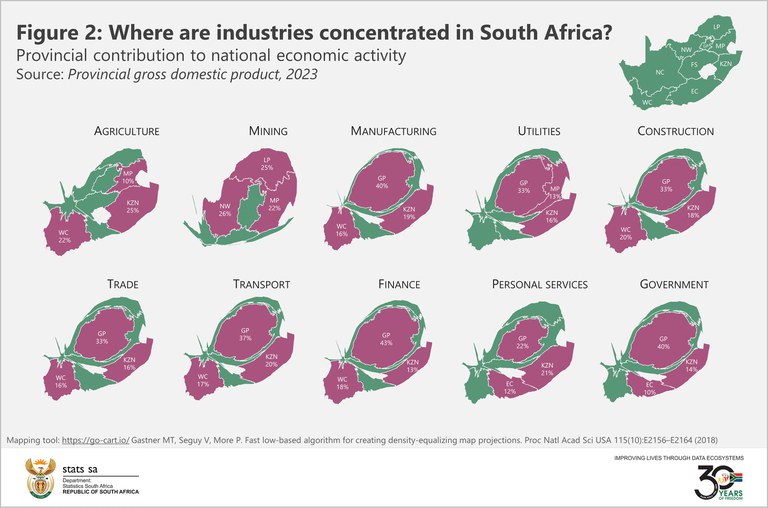
John Endres
On the website of Stats SA you will find a rather remarkable chart. It redraws the map of South Africa by resizing the provinces in accordance with their contribution to various types of economic activity.

The hypertrophied heart at the centre of almost all of these maps is the province of Gauteng: biggest in manufacturing, utilities, construction, trade, transport, finance, personal services and government.
Remarkably, this is despite the province’s minute physical footprint: it accounts for just 1.5% of the country’s land area, smallest of all the provinces – but has the largest population, 25.3% of SA’s total.
A large population in a small area means a high population density. Gauteng’s population density of 876 people per square kilometre is over six-and-half times that of KwaZulu-Natal, the second most densely populated province. In fact, Gauteng’s population density is comparable to that of the Gaza Strip and the West Bank, which register at 892 people per square kilometre. You will find even higher population densities in Gauteng’s three metros of Johannesburg, Ekurhuleni and Tshwane, where 87% of the Gauteng population live.
Gauteng is a bubbling cauldron of migration, contestation and ideas. An August 2024 report by the Centre for Risk Analysis, “Macro Review: Demographics without Dividends”, shows that around 640,000 people are estimated to leave Gauteng between 2021 and 2026. But around 1.4 million are expected to come to the province during the same period, swelling its population by about 750,000 net new residents. (For comparison, the second-ranked province, the Western Cape, is expected to attract around 310,000 net migrants over the same period, including 115,000 from Gauteng and 180,000 from the Eastern Cape.)
The numbers show that Gauteng remains the destination of choice for many people from South Africa and beyond who are in search of a better life. It maintains its historical reputation as a place of migrants, where opportunity beckons and folks from many different walks of life come together.
Gauteng residents cannot afford to be cliquey. They have to be open to encounters with new people and new ideas. The province’s high population density also means that the average Gautenger is likely to have far more interactions with people from other walks of life, who hold different ideas and see the world in different ways.
All of this makes Gauteng the glittering prize in South Africa’s political firmament. It offers greater opportunity for fame and patronage, more resources, more stimulus and greater rewards for politically ambitious leaders. Its economy contributes 33.2% of GDP – more than the next two provinces put together – and is larger than that of Kenya.
Its politics are among the most competitive in the country, as voters are informed through more news sources and more interactions with fellow residents, and are more willing to test giving a different party their vote than residents in the rural provinces, for example. The traditionally dominant African National Congress (ANC) saw its share of the vote collapse from 50% in 2019 to 35% in 2024.
Gauteng is also where the battle for the soul of the ANC is being fought out. The communist presmier of Gauteng, Panyaza Lesufi, is not a fan of the Government of National Unity arrangement which includes the Democratic Alliance (DA). He has made sure to exclude the DA from his provincial government, even though he has to govern through a minority government that controls just 32 of the 80 seats in the legislature. Equally, he has taken care to get the DA out of the municipal government of the three metros.
His intention is to use Gauteng as a test case to demonstrate that an ANC-EFF combination can be stable and effective. It is a combo he can take to the ANC national conference in 2027 and try sell there: both to position himself for the top job, and to strengthen the anti-GNU wing of the ANC.
If he is successful, and manages to parlay his gamble into growing influence and ultimately control of the ANC, then the prospects for South Africa are dire.
An ANC reoriented on revolutionary policies, inspired by and perhaps in alliance with the EFF or Jacob Zuma’s state capture reunion party, uMkhonto weSizwe, will turbocharge the National Democratic Revolution in South Africa. That will mean more racial polarisation, weaker property rights, wild populist promises (for which Lesufi has already made a name for himself), higher spending, more state interventionism, and a push to nationalise the economy and expropriate private property.
Then South Africa’s development trajectory will turn deeply negative. Investors will flee, growth will crater, unemployment will skyrocket. As SA’s economic heart goes into cardiac arrest, secessionists in the Western Cape and KZN will be strengthened. It will herald the break-up of South Africa as a state, and the evaporation of its potential as a large, integrated and industrialised economy that can generate enough value to lift millions of South Africans out of poverty.
The stakes are high. Parties, individuals and businesses that understand this and want to avoid an NDR outcome for South Africa know that they must allocate a large share of their 2026-focused attention to this province. The implications of who wins extend far beyond the province and far beyond the present moment.
John Endres is CEO of the Institute of Race Relations (IRR)
https://www.politicsweb.co.za/opinion/who-wins-gauteng-will-decide-south-africas-future
 LETTER | Rethinking BEE premiums could unlock billions for growth - Business Day
Feb 19, 2026
LETTER | Rethinking BEE premiums could unlock billions for growth - Business Day
Feb 19, 2026
 IRR’s 2026 Budget tips for Minister Godongwana
Feb 19, 2026
IRR’s 2026 Budget tips for Minister Godongwana
Feb 19, 2026
 Corruption-busting must begin with next week’s Budget – IRR
Feb 18, 2026
Corruption-busting must begin with next week’s Budget – IRR
Feb 18, 2026
 Hold Ramaphosa to account for his SONA admissions of failure, IRR urges MPs
Feb 17, 2026
Hold Ramaphosa to account for his SONA admissions of failure, IRR urges MPs
Feb 17, 2026
 Corrigan pt. II: FMD crisis — How did we get to this point? - Biznews
Feb 16, 2026
Corrigan pt. II: FMD crisis — How did we get to this point? - Biznews
Feb 16, 2026

 LETTER | Rethinking BEE premiums could unlock billions for growth - Business Day
Feb 19, 2026
LETTER | Rethinking BEE premiums could unlock billions for growth - Business Day
Feb 19, 2026
 IRR’s 2026 Budget tips for Minister Godongwana
Feb 19, 2026
IRR’s 2026 Budget tips for Minister Godongwana
Feb 19, 2026
 Corruption-busting must begin with next week’s Budget – IRR
Feb 18, 2026
Corruption-busting must begin with next week’s Budget – IRR
Feb 18, 2026
 Hold Ramaphosa to account for his SONA admissions of failure, IRR urges MPs
Feb 17, 2026
Hold Ramaphosa to account for his SONA admissions of failure, IRR urges MPs
Feb 17, 2026
 Corrigan pt. II: FMD crisis — How did we get to this point? - Biznews
Feb 16, 2026
Corrigan pt. II: FMD crisis — How did we get to this point? - Biznews
Feb 16, 2026